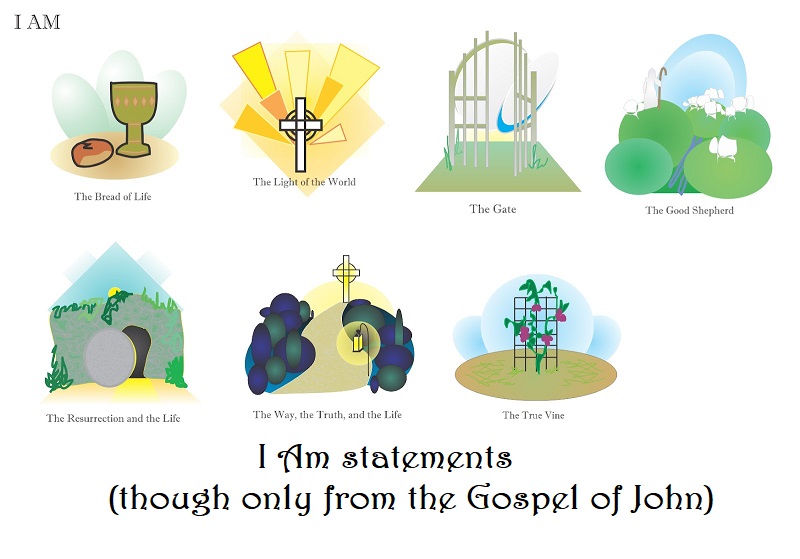
I Am…
By Anthony Casperson
7-15-17
Recently, I’ve been reading novels in the Dresden Files series by Jim Butcher. I’d started the series a couple of years ago. I read about 4 ½ books and stopped. (The reasons for which aren’t necessary to explain.)
I started right where I’d left off. (Yeah, I continued halfway through the book I’d started nearly two years previous. I’m crazy like that.) Memories of the private investigator with wizardly powers and his allies came back pretty quickly. And this, in part, had to do with something that Jim Butcher does in his character descriptors.
Major characters in the books have certain words that belong solely to them. When you see these words, these descriptors, you know immediately about whom the author speaks. It’s like a narrative facial scan. You read those keywords and the match brings up one character’s face in your mind’s eye.
For instance, when you read about a “tall” man wearing a “duster” and holding a “blasting rod” you know that it’s the main character of the series, Harry Dresden. Harry’s police officer friend Karrin Murphy is given the words “short,” “blond,” and “cute nose.” She’s also a tough fighter, but those three descriptors are the main ones given for her. And when you read about a man with “dark hair,” “pale skin,” and is very “attractive” you know this is Thomas, an incubus of the White Court of vampires. And the list goes on.
The specific words give readers a type of shorthand to know what character is in action at any specific time. It allows us to know who it is without having to read their names 50 billion times. In writing, this method is quite useful (and one that I need to work on).
But this isn’t just something done in writing. Words that are connected to people have a type of power over how others see that person and how they view themselves. It gives a shorthand to their being, their very soul. A connection nearly as strong as (if not stronger than) their own name.
This train of thought reminded me of a paper that I wrote in bible college. The class was called “Doctrine of Christ.” Largely, the class revolved around each student researching a topic in the teachings about Jesus, writing a 20-25 page paper, and evaluating everybody else’s work.
The paper I wrote was entitled “I Am Sufficient: Viewing the ‘I Am’ Statements of Christ in Johanine Literature.” (It was a scholarly paper, and calling it “A look at Jesus’ use of ‘I Am’ in the Apostle John’s writings” would’ve been frowned upon.) I thought about posting it here, but I figured most people would just say, “No, tl;dr” and move on to something more pressing in their lives.
The gist of the paper was that part of John’s purpose in including these “I Am” statements in his gospel and the book of Revelation was to show that Jesus is sufficient to supply every need we have. All things that we as Jesus’ followers could ever possibly need comes from him.
Jesus is: the Bread of Life; the Light of the world; the Door; the Good Shepherd; the Resurrection and the Life; the Way, the Truth, and the Life; the True Vine; the Alpha and the Omega; and the Root and Descendant of David. Each piece combines to give a complete image of what Jesus supplies to those who are his.
And he can be all of these things because he is the God-man. Each image comes along with the words “I am.” Now to many, this might not seem like much of anything. However, to readers of the bible the words “I am” have a sort of narrative facial scan that points us to God. Especially when written in the full manner given in the writings of John.
[Quick Greek/Hebrew language lesson: You can write the words for “I am” in both languages by merely conjugating the verb in the right way. However, if you include the word for “I” along with it, this brings an emphasis to the “I” part of it.]
Jesus, when he spoke these things (and John, when he later wrote them), is fully intending to say that he, as part of the triune God, is capable of supplying everything that we could possibly need. He does this by giving several different images while combining it with these words that belong solely to God.
The words point back to God’s interaction with Moses at the burning bush in Exodus 3:14. Moses asked God’s name. He replies, “I am who I am. Tell them that I Am has sent you.” God gives his name as I Am. The descriptor is his name. The name Yahweh (or Jehovah as it is often written) comes from that verb for “I am,” meaning something along the lines of “The Being One” or “The One Who Is.”
And Jesus use of those words points us to the fact that Jesus is God.
It’s my intention over the next few weeks to look at each of these “I Am” statements and look at the various images to see all of the ways that Jesus supplies all that we as his followers need. But this whole short adventure must be initiated that the only reason why we can find our needs met by Jesus. He truly is I Am.
Without that understanding, he’s just a character stealing someone else’s descriptors.
By Anthony Casperson
7-15-17
Recently, I’ve been reading novels in the Dresden Files series by Jim Butcher. I’d started the series a couple of years ago. I read about 4 ½ books and stopped. (The reasons for which aren’t necessary to explain.)
I started right where I’d left off. (Yeah, I continued halfway through the book I’d started nearly two years previous. I’m crazy like that.) Memories of the private investigator with wizardly powers and his allies came back pretty quickly. And this, in part, had to do with something that Jim Butcher does in his character descriptors.
Major characters in the books have certain words that belong solely to them. When you see these words, these descriptors, you know immediately about whom the author speaks. It’s like a narrative facial scan. You read those keywords and the match brings up one character’s face in your mind’s eye.
For instance, when you read about a “tall” man wearing a “duster” and holding a “blasting rod” you know that it’s the main character of the series, Harry Dresden. Harry’s police officer friend Karrin Murphy is given the words “short,” “blond,” and “cute nose.” She’s also a tough fighter, but those three descriptors are the main ones given for her. And when you read about a man with “dark hair,” “pale skin,” and is very “attractive” you know this is Thomas, an incubus of the White Court of vampires. And the list goes on.
The specific words give readers a type of shorthand to know what character is in action at any specific time. It allows us to know who it is without having to read their names 50 billion times. In writing, this method is quite useful (and one that I need to work on).
But this isn’t just something done in writing. Words that are connected to people have a type of power over how others see that person and how they view themselves. It gives a shorthand to their being, their very soul. A connection nearly as strong as (if not stronger than) their own name.
This train of thought reminded me of a paper that I wrote in bible college. The class was called “Doctrine of Christ.” Largely, the class revolved around each student researching a topic in the teachings about Jesus, writing a 20-25 page paper, and evaluating everybody else’s work.
The paper I wrote was entitled “I Am Sufficient: Viewing the ‘I Am’ Statements of Christ in Johanine Literature.” (It was a scholarly paper, and calling it “A look at Jesus’ use of ‘I Am’ in the Apostle John’s writings” would’ve been frowned upon.) I thought about posting it here, but I figured most people would just say, “No, tl;dr” and move on to something more pressing in their lives.
The gist of the paper was that part of John’s purpose in including these “I Am” statements in his gospel and the book of Revelation was to show that Jesus is sufficient to supply every need we have. All things that we as Jesus’ followers could ever possibly need comes from him.
Jesus is: the Bread of Life; the Light of the world; the Door; the Good Shepherd; the Resurrection and the Life; the Way, the Truth, and the Life; the True Vine; the Alpha and the Omega; and the Root and Descendant of David. Each piece combines to give a complete image of what Jesus supplies to those who are his.
And he can be all of these things because he is the God-man. Each image comes along with the words “I am.” Now to many, this might not seem like much of anything. However, to readers of the bible the words “I am” have a sort of narrative facial scan that points us to God. Especially when written in the full manner given in the writings of John.
[Quick Greek/Hebrew language lesson: You can write the words for “I am” in both languages by merely conjugating the verb in the right way. However, if you include the word for “I” along with it, this brings an emphasis to the “I” part of it.]
Jesus, when he spoke these things (and John, when he later wrote them), is fully intending to say that he, as part of the triune God, is capable of supplying everything that we could possibly need. He does this by giving several different images while combining it with these words that belong solely to God.
The words point back to God’s interaction with Moses at the burning bush in Exodus 3:14. Moses asked God’s name. He replies, “I am who I am. Tell them that I Am has sent you.” God gives his name as I Am. The descriptor is his name. The name Yahweh (or Jehovah as it is often written) comes from that verb for “I am,” meaning something along the lines of “The Being One” or “The One Who Is.”
And Jesus use of those words points us to the fact that Jesus is God.
It’s my intention over the next few weeks to look at each of these “I Am” statements and look at the various images to see all of the ways that Jesus supplies all that we as his followers need. But this whole short adventure must be initiated that the only reason why we can find our needs met by Jesus. He truly is I Am.
Without that understanding, he’s just a character stealing someone else’s descriptors.


Dresden Files series...so far.


